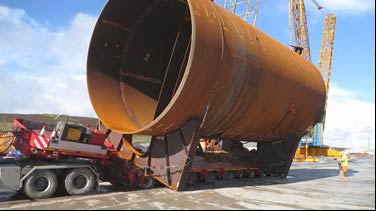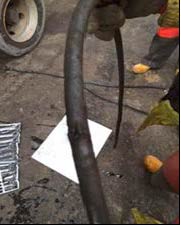Hydraulic hose failure caused collapse of heavy haulage trailer
A member has reported an incident in which a low loader collapsed at the quayside while carrying a 157t suction pile. Suction piles (16m x 6m, 157t) were being transported to the quayside upending and storage area. The piles had previously been received at the site and moved from the quayside to their respective storage locations without incident using the heavy haulage trailer. Around 20 suction piles had been delivered to the support base and positioned in the storage areas. In readiness for mobilisation and offshore installation the suction piles were to be moved to an area close to the quayside before being up ended (positioned vertically).
Whilst the trailer was moving at a slow walking speed along the quayside, one of its hydraulic hoses burst. The hose was located near the rear of the trailer. This caused a loss of hydraulic pressure which caused the trailer to sink on the nearside which in turn made the load lower toward the quay. The wheels on the trailer’s offside lifted clear of the ground approximately 20cm and on the nearside of the trailer the suction pile saddles made contact with the concrete.
Following the incident the crawler cranes that were to offload at the upending area were tracked to the location and used to stabilise the load prior to levelling out the trailer (suspension on offside lowered). The trailer was then moved clear and the load transported to the upending area on the cranes.


The following lessons were learnt:
- The hydraulic hose that failed was located behind the wheel arch running along the chassis of the trailer; it was quite inaccessible for regular cleaning, inspection and maintenance;
- The location of the hose was considered a ‘dirt trap’ which is considered likely to have led to its deterioration and subsequent failure;
- The critical nature of this hose was not understood, and it was not recognised that failure could cause the trailer to list;
- As a consequence of the above, no hose inspection or change out frequency had been specified;
- The potential for failure of the suspension to cause the load to list was not considered at the risk assessment.
The incident highlights the need for suppliers and operators of specialist equipment to determine fully the potential critical failures of equipment and take preventative measures accordingly. Such failures should also be considered as part of risk assessments and, where appropriate, additional controls and required recovery measures agreed prior to the operation.
Members may wish to consider the following points when planning similar operations:
- Check planned inspection and maintenance systems of equipment – are critical items considered;
- Risk assessments – are potential failures and effects considered and assessed;
- Consider pre-use checks of similar trailers – can a test to working pressure be conducted prior to loading.
After much searching using various key words, it can be established that whilst there are a number of incidents involving hydraulic hose failure, and any number of incidents in which the amongst the causes identified were failure to identify risks, this incident combining the two is without precedent in the IMCA Safety Flash system.
Safety Event
Published: 8 July 2014
Download: IMCA SF 11/14
IMCA Safety Flashes
Submit a Report
IMCA Safety Flashes summarise key safety matters and incidents, allowing lessons to be more easily learnt for the benefit of all. The effectiveness of the IMCA Safety Flash system depends on Members sharing information and so avoiding repeat incidents. Please consider adding [email protected] to your internal distribution list for safety alerts or manually submitting information on incidents you consider may be relevant. All information is anonymised or sanitised, as appropriate.
IMCA’s store terms and conditions (https://www.imca-int.com/legal-notices/terms/) apply to all downloads from IMCA’s website, including this document.
IMCA makes every effort to ensure the accuracy and reliability of the data contained in the documents it publishes, but IMCA shall not be liable for any guidance and/or recommendation and/or statement herein contained. The information contained in this document does not fulfil or replace any individual’s or Member's legal, regulatory or other duties or obligations in respect of their operations. Individuals and Members remain solely responsible for the safe, lawful and proper conduct of their operations.
